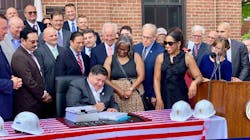Gov. Pritzker signs $45 billion capital bill into law
Illinois Gov. JB Pritzker signed the state's first long-term capital package on June 28, Rebuild Illinois Capital Plan, marking the first time since 2009 that the state has had a comprehensive capital plan in place.
The six-year, $45-billion plan will be financed through an increased gas tax, as well as an increase on vehicle, title and commercial distribution fees. The legislative package, which consists of four separate pieces of legislation, provides $22.6 billion in additional bonding authority, which will allow the state to fund much needed improvements in infrastructure in every region. Additionally, the package comes with protections in place that require local governments to use transportation revenues and fees for transportation purposes only.
"With this historic $45 billion capital plan, we're fixing decades-long problems, creating good jobs, improving communities for the next generation - and doing it together, across party lines," said Gov. Pritzker. "The Rebuild Illinois plan transforms our state's approach to transportation infrastructure, finally treating our roads, bridges and railways like 21st century investments and not relics of the past. We're also making critical investments in our higher education institutions, our crime lab and veterans' homes, early childhood centers and expanding broadband access to communities across Illinois. With these investments, we're creating and supporting hundreds of thousands of new jobs in our state. This is more than an infrastructure plan. This is a job creation plan the likes of which our state has never seen."
The $33.2 billion for transportation is broken down into the following areas:
- Over $14 billion for new roads in bridges:
- $10.4 billion for state roads and bridges
- $3.9 billion for local governments to rebuild their roads and bridges
- Nearly $11 billion for Illinois Department of Transportation's Multi-Year Plan for roads and bridges
- $4.5 billion for mass transit, including the Regional Transportation Authority (CTA, Metra and Pace)
- $1 billion for passenger rail, including Amtrak and other inter-city rail projects
- $558 million for aeronautics
- $492 million for the Chicago Region Environmental and Transportation Efficiency Program (CREATE)
- $312 million for grade crossing protection
- $150 million for ports
- $679 million for other transportation projects
Mass transit's $4.5 billion includes $3 billion in bonding and $1.5 billion in new pay-as-you-go funding to invest in mass transit throughout the state. The Regional Transportation Authority (RTA) will see more than $4 billion in funds while transit districts outside of RTA will share $450 million to maintain and improve their systems.
The more than $1 billion dedicated to rail improvements include $225 million to re-establish passenger rail service between Chicago and the Quad Cities, $275 million to re-establish passenger rail service between Rockford and Chicago, $100 million for improvements to improve safety and reliability on Amtrak’s Saluki service between Chicago and Carbondale, $400 million in new funds for projects in the CREATE Program and $78 million in new funds to upgrade rail crossings and improve safety throughout the state.
RTA Executive Director Leanne Redden, Metra Executive Director Jim Derwinski, CTA President Dorval Carter and Pace Executive Director Rocky Donahue issued a joint statement following Gov. Pritzker's signing of the bill that said the infrastructure program will have "transformative effects on the regional transit system for which the RTA, the CTA, Metra and Pace are responsible."
The transit leaders statement read in part, "As we had long advocated, Rebuild Illinois provides the first-ever sustainable 'pay as you go' funding that will generate about $227 million per year for capital investments in the transit system of northeastern Illinois and $25 million for transit elsewhere in the state. Adding a further $2.7 billion on bonding revenue for our region over the next five years, the bill begins to address an over-reliance on federal funds for capital and provides the type of consistent funding that is essential for effective planning and programming of projects. While the total falls short of the region's $30 billion in transit capital needs over the next decade, make no mistake: It is a significant step forward."
According to the American Council of Engineering Companies (ACEC), Illinois is now the 31st state since 2012 to enact infrastructure programs with increased user fees and other revenues and the association framed the state-level move in the larger national conversation surrounding infrastructure.
“The new normal, proven by the states, is that politicians don’t risk losing their seats if they vote for an infrastructure tax – they risk their seats if they fail to act while our infrastructure crumbles down around us,” said ACEC President and CEO Linda Bauer Darr. "Ten states are a trend; 31 is a wave. The American people are sick and tired of broken roads and endless delays. Congress and the White House need to wake up to this new reality and deliver on the promises they made to the voters on infrastructure.”
About the Author

Mischa Wanek-Libman
Group Editorial Director
Mischa Wanek-Libman is director of communications with Transdev North America. She has more than 20 years of experience working in the transportation industry covering construction projects, engineering challenges, transit and rail operations and best practices.
Wanek-Libman has held top editorial positions at freight rail and public transportation business-to-business publications including as editor-in-chief and editorial director of Mass Transit from 2018-2024. She has been recognized for editorial excellence through her individual work, as well as for collaborative content.
She is an active member of the American Public Transportation Association's Marketing and Communications Committee and served 14 years as a Board Observer on the National Railroad Construction and Maintenance Association (NRC) Board of Directors.
She is a graduate of Drake University in Des Moines, Iowa, where she earned a Bachelor of Arts degree in Journalism and Mass Communication.
